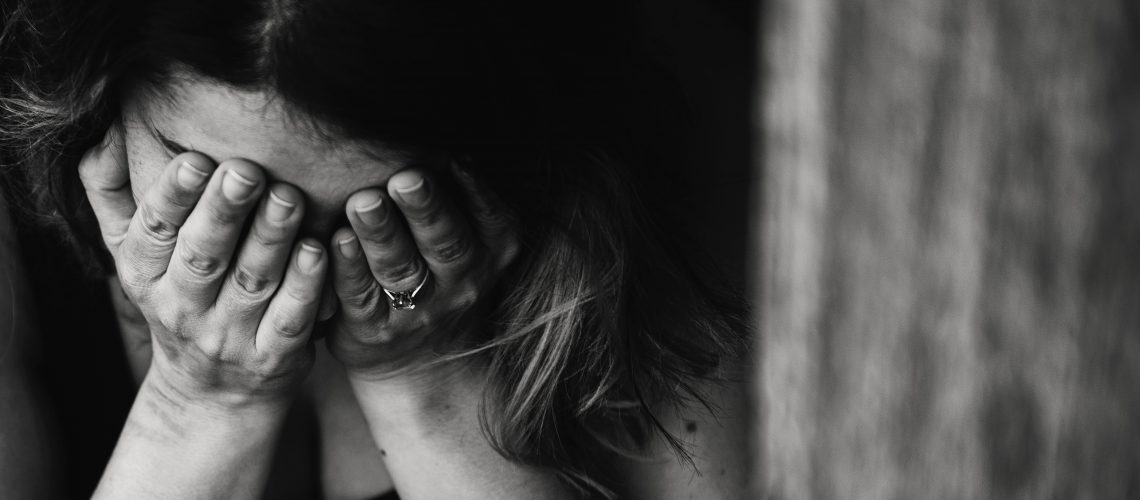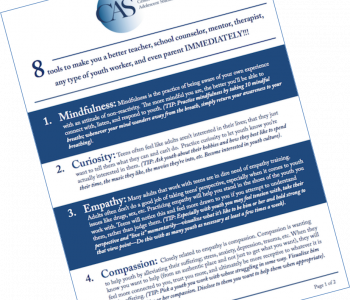

catharine hannay, ma
Catharine Hannay is the founder of MindfulTeachers.org and the author of Being You: A Girl’s Guide to Mindfulness, a workbook for teen girls on mindfulness, compassion, and self-acceptance.
How Our Own ACEs Impact Trauma Work with Youth
While you were growing up:
- Were your parents or caregivers unloving, unsupportive, or neglectful?
- Were you threatened or abused?
- Did you witness the abuse of one of your caregivers?
- Did you live with anyone who had a mental illness or a problem with alcohol or drugs?
These are all examples of ACEs, or Adverse Childhood Experiences. The term ACEs first appeared in a study of the relationship between childhood trauma and adult illness.
Over the past few years, there’s been an increasing awareness of ACEs and interest in trauma-informed teaching and therapy. We should also keep in mind how much our own trauma histories may continue to impact those of us who work with youth.
In her book on Trauma Stewardship, Laura van Dermoot Lipsky explains that “Some people feel driven to work in a field that is connected to an earlier trauma in their life; consciously or not, they intend to master the haunting echoes of a previous time… The more personal our connection to our work, the greater the gifts we bring to it—perhaps. At the same time, the more we identify with the type of trauma we’re exposed to, the greater the impact on us may be… to the point that we experience their anguish in a debilitating way… We can sustain our work with trauma only if we combine our capacity for empathy with a dedication to personal insight and mindfulness.”
How much should I tell youth about my own experiences?
While it’s essential to be aware of how our own backgrounds may impact our work, it’s not always a good idea to discuss this with our students or clients.
In his online course on Building Authentic Relationships with Teens, Dr. Sam Himelstein gives three reasons why it might not be appropriate to disclose our own ACEs or other traumatic experiences:
Red Flag #1: You wouldn’t want the whole class/group to know about this experience (if the youth discuss it amongst themselves).
As helping adults, we have ethical standards about when and how to disclose sensitive information about our students or clients. It isn’t realistic to expect the same level of confidentiality from teens, and it isn’t fair to treat an individual student or client like our special friend or confidant who knows our secrets.
Red Flag #2: You’re unable to discuss the experience without a strong emotional reaction.
For example, you might want to empathize with a youth who’s been abused by mentioning that you endured a similar type of abuse. While this could be helpful in some situations, if you become tearful or overwrought while discussing your own traumatic experiences, roles will be reversed and the young person will be put in the position of comforting you.
Red Flag #3: Talking about your own background could take attention away from the youth’s experiences.
In a previous guest post, I mentioned a counselor who kept talking about his troubled relationship with his mother. The problem isn’t that he was reminded of his own situation. That was a natural and unavoidable human reaction. The problem is that he wasn’t able to discuss his own experiences in a way that was helpful to me as a client.
What can I do if I feel triggered while working with youth?
The closer our own history to the experiences of the young people we work with, the more likely they’ll say something that upsets us. While we can’t help being triggered, we can take steps to manage our own experience.
In his course on Trauma-Informed Care, Dr. Himelstein explains a practice called T.A.P., which stands for:
Take a Breath.
Deep breath in. Deep breath out. Take a few seconds to clear your head and release any tension or strong feelings.
Acknowledge.
Briefly reflect on what exactly is upsetting you. Do you feel saddened or angered by what you’ve just heard? Are you finding it hard to concentrate because you’re reminded of an incident from your past?
Proceed.
As quickly as possible, redirect your attention back to the youth and what he or she needs from you in that moment.
In contrast to the counselor I mentioned earlier, I recently had an experience with a spiritual advisor who responded in a very skillful way. When I mentioned a dilemma I was facing, his eyes widened and he said “Wow, that really hit home.” He closed his eyes and drew into himself for a few seconds, then said (partly to himself, partly to me) “This isn’t about me right now.” Then he opened his eyes and calmly returned to our discussion.
After that incident I felt even more trusting of him and even more willing to listen to his advice, both because he handled the situation so well and because he clearly understood my dilemma.
Conclusion: Caring for Ourselves So We Can Care for Others
Many of us are drawn to the helping professions because we want to protect youth against the ways we suffered ourselves when we were their age. It’s important to recognize the effect this continues to have on us, and to make sure we respond in ways that are beneficial to the youth we work with and not detrimental to ourselves.
Self-awareness and self-care are critical in recognizing our own triggers and making sure we’re acting in our own best interests as well as the best interests of the youth we serve. The goal isn’t to deny or suppress our own negative experiences but to transform them in a way that’s of benefit to the next generation.
—
Catharine Hannay (MA TESOL, MS Communications) has twenty years of experience as a teacher, including a dozen years at Georgetown University’s Center for Language Education and Development. She is the founder and editor of MindfulTeachers.org, which provides free resources on mindfulness and self-care for educators and other helping professionals.

